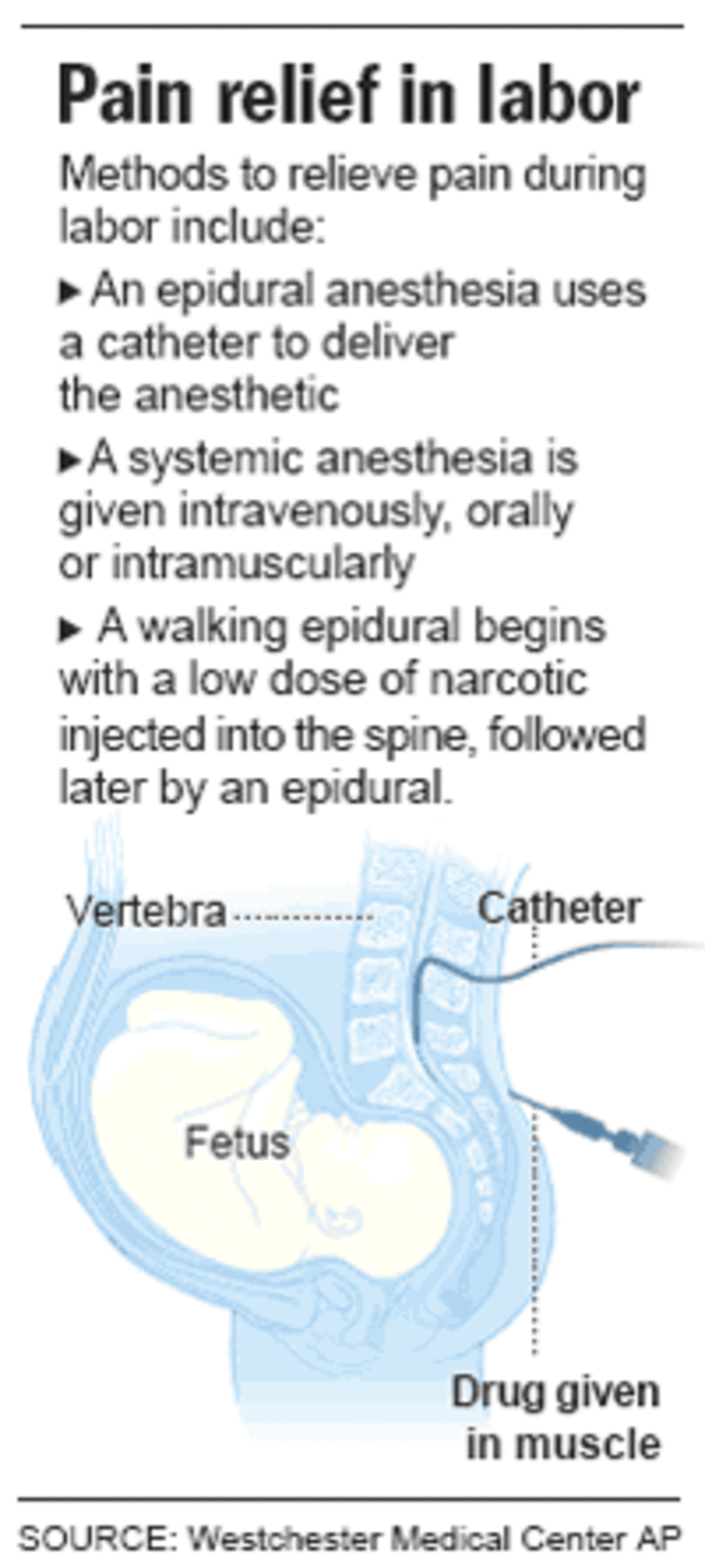Pregnant women can be given a low-dose epidural early in labor without raising their chances of a Caesarean section, according to a study that could change the way obstetricians practice and make childbirth a lot less painful for many mothers-to-be.
The finding could lead doctors to consider offering early epidurals to hundreds of thousands more American women in first-time labor each year.
Though medical authorities recently dropped their reservations about giving women epidurals early in labor, some doctors and patients still prefer to wait until labor is further along. They worry that the painkiller’s numbing effect will interfere with a woman’s ability to push, prolonging labor and prompting a C-section.
This study appears to debunk the notion about C-sections and calls into question the one about prolonged labor, too.
'No shame in asking for an epidural'
“Women often feel guilty or weak when they request an epidural early in labor. I hope this study will help women see that there is no shame in asking for an epidural,” said lead author Dr. Cynthia Wong of Northwestern University in Chicago. “The message for women and their obstetricians and gynecologists is that there is no reason why women who want an epidural should not get it when they first request it.”
The study was reported in Thursday’s New England Journal of Medicine.
More than 3.5 million women go into labor each year in this country. Epidural use has greatly expanded over the past decade, to more than 1.5 million women annually.

Epidurals deliver numbing medicine through a skinny plastic tube that is threaded into the back, close to spinal nerves, mostly bypassing the mother’s bloodstream. More recent techniques, sometimes called “walking epidurals,” provide lighter doses, allow women to push, and even enable them to walk throughout labor.
Doctors have welcomed epidurals as an alternative to “systemic” pain medicine through the bloodstream, which can leave a woman feeling nauseated and doped-up and even enter the baby’s body.
The Northwestern University study tested a type of low-dose pain relief known as a “combined spinal epidural.” A small dose of pain reliever is first injected into the spinal fluid, and the epidural is later fed through the same hole into a space a bit farther from the spine.
In this study, 728 women in first-time labor were divided into two groups. One group received the spinal shot and then got epidurals when the cervix was dilated to about 2 centimeters. The other group initially received pain-relieving medicine directly into their bloodstreams, and put off epidurals until 4 centimeters if they could tolerate the pain.
In the end, the C-section rate was statistically a tie: 18 percent in the early epidural group and 21 percent in the delayed group.
Shorter deliveries
The early epidural group also delivered 90 minutes sooner than the other women, who averaged eight hours in labor. However, Dr. Gary Hankins, an obstetrician at the University of Texas Medical Branch at Galveston who helped shape the medical guidelines, said it is not clear if that finding would apply broadly.
Lisa DeCook of Glenview, Ill., was a study subject in the early epidural group and delivered her daughter vaginally. She said the pain before the epidural was “intense.”
“Then once I got it, I really don’t remember feeling any pain or contractions. It was good for me,” she said. She chose an epidural on Tuesday when she vaginally delivered her second healthy baby, a boy, at Northwestern Memorial Hospital.
The finding seems to contradict some previous research showing that women who got early epidurals underwent more C-sections. In 2002, the American College of Obstetricians and Gynecologists recommended against epidurals before 4 centimeters of dilation. In July, though, it dropped a specific threshold.
“There’s really no reason to withhold the treatment if a women is in terrible pain at 1 or 2 or 3 centimeters dilation,” said Dr. David Birnbach, a University of Miami anesthesiologist who is on the College of Obstetricians committee that devises the guidelines.
As for why the earlier research reached a different conclusion, it could be that some of the women had underlying problems — such as an unusually big baby — that can cause more pain, make women request early epidurals, and also require a C-section, researchers said.
This study examined only first pregnancies, but C-sections are less frequent and therefore less of a worry in later pregnancies.
Other studies would be needed to settle whether early epidurals promote C-sections at higher doses or in case of medically induced labor, doctors said.